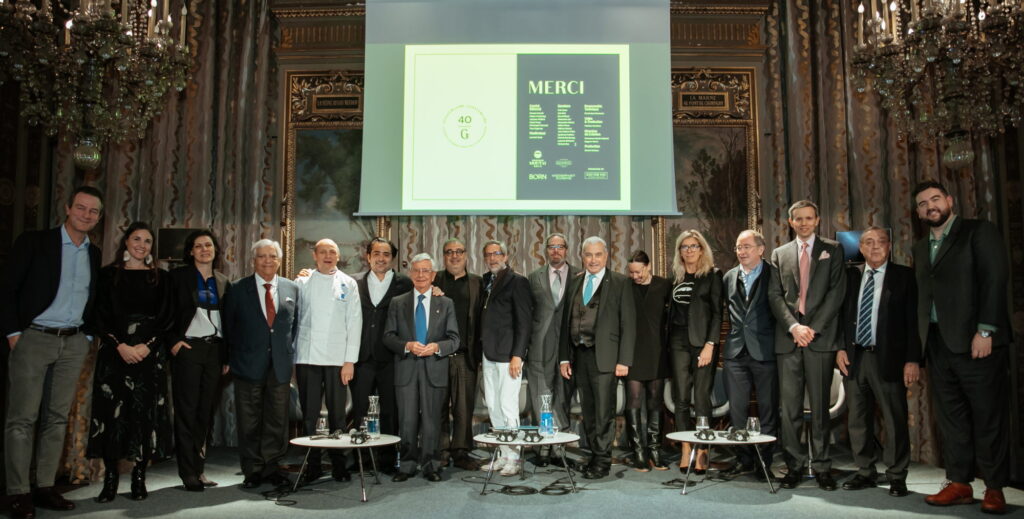The conference on the evolution of gastronomy in the 21st century revolves around three current themes and is moderated by Laurent Guez, Food Editorial Director of the Les Échos-Le Parisien Group: “1983 was a good year. I am very pleased to be with you to celebrate the 40th anniversary of the A. I.G.”
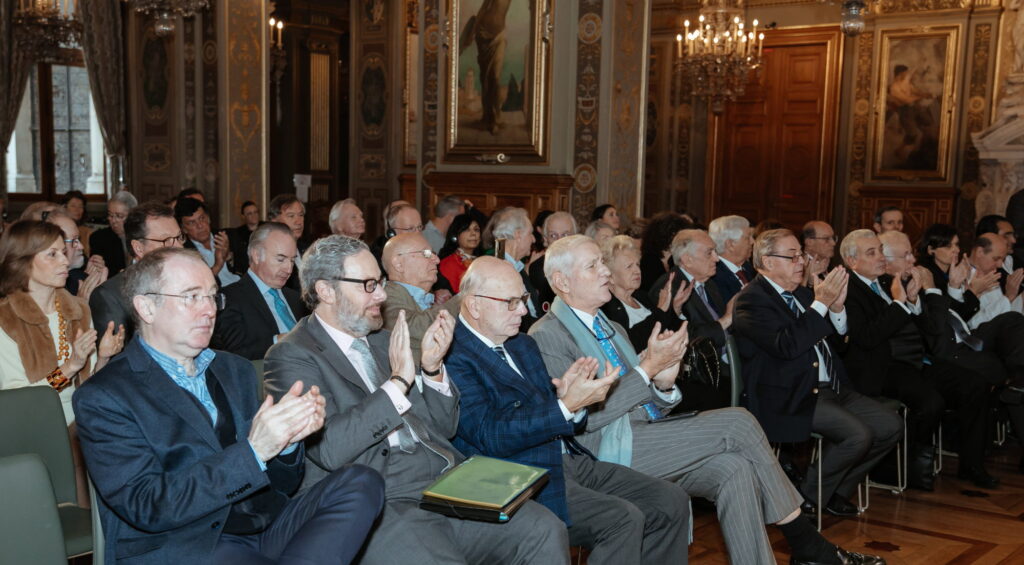
Rafael Anson, Founder and Honorary President of the A.I.G., presents the Manifesto of the Academy. ”The concept of gastronomy has evolved. You have to eat well to reach 88 years old like me. Health, solidarity and satisfaction. Nutrition and sociability account for 50% of health. There are different types of cuisine.”
Nicolas Kenedi continues: “Ten commitments for the future.
- Gastronomy is the reasoned knowledge of how people eat. Its purpose is to ensure the continuity of humanity by means of the healthiest food possible (Brillat-Savarin 1826).
- While aiming for excellence in terms of pleasure, gastronomy must promote food safety and health, encouraging a healthy, varied and balanced diet, avoiding excess salt, sugar, saturated fats, additives.
- There is no gastronomy without good products because gastronomy is used to highlight the product and not to camouflage its defects. This applies to all food sectors.
- Respect for the seasonality of products is essential, as in any activity linked to nature, and local products must be favoured because a product is better in its production period without unnecessary transport.
- The corollary of these proposals is the ecological respect of our planet and the protection of its biodiversity.
- It is also necessary to protect gastronomic cultures (such as local cuisine) from globalization and standardization; Gastronomy is a fundamental part of cultural expression.
- The role of Chefs and their teams is fundamental. Their knowledge and creativity are a driving force behind the evolution of culinary tastes.
- Gastronomy must include all culinary traditions, it must be accessible to all and include home cooking, street food and all categories of restaurants.
- Gastronomy is and will remain an important component of tourism, combining culinary pleasures and discoveries with those of travel.
- All this will only be possible if an educational program is developed, ranging from taste education in young children to professional training in the hospitality industry.”
The conference will address the following three themes: Gastronomy and Benevolence; Have we lost our grandmothers? Are all words equal?
Gastronomy and benevolence
In the first theme, participants include Fadi Abou (founder of the Less saves the planet movement), Inès Blal (dean of the École Hôtelière de Lausanne), Éric Briffard (executive chef and director of Culinary Arts at Le Cordon Bleu), and Jean-Robert Pitte (geographer and member of the Academy of Moral and Political Sciences). Jean-Robert: “Gastronomy is a tool of diplomacy, it unifies people.”
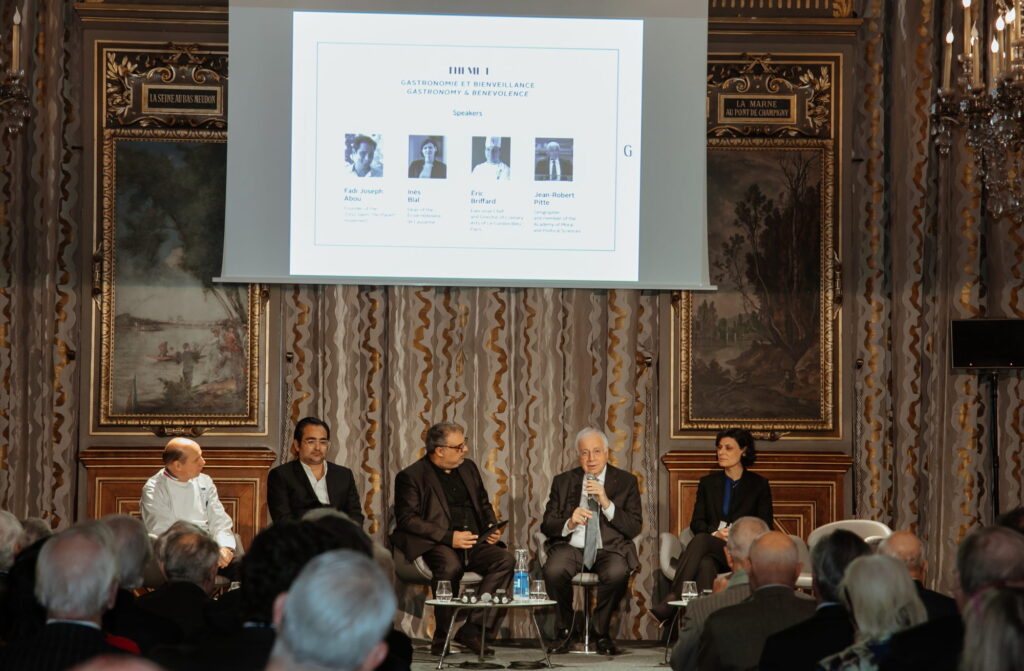
Inès: “Gastronomy promotes human contact and has a benevolent approach.”
Fadi: “Gastronomy is at the service of the environment: it was the opposite before. The movement was launched in Monaco 6 years ago. One day, Pharaoh had a dream, he saw 7 fat cows followed by 7 lean cows coming out of the river which swallowed the first ones. Then a second dream with 7 full and 7 empty ears of wheat. He asked Joseph (who had been sold by his brothers out of jealousy) the meaning of his dream, who interpreted the dream as follows: 7 years of plenty will be followed by 7 years of famine. He advised Pharaoh to store up some of the crops in anticipation of the bad years to come. Pharaoh put Joseph in charge of the work, stockpiled food, and rationed food, which saved Egypt from famine. Kindness and forgiveness.”
Eric: “In Burgundy, there is a transmission of benevolence. There is an agricultural solidarity and a wonder in front of nature. The chef’s goal is to please the guests. Cooking is a permanent link with nature and its products. Their contemplation is zen. The chefs adapt to the food tastes of the guests. There are religious prohibitions that must be respected. More than 60% of the Chefs are women.”
Fadi: “Water is a major problem, with a lot of consumption, it’s a big heresy. The solution came from Japan, they magnify the tea ceremony. You have to take the time to eat with your eyes closed. The UN has announced that meat and grain production is the leading cause of global warming.”
Have we lost our grandmothers?
The second theme includes Céline Pham (chef), Apollonia Poilâne (baker and CEO of Poilâne), Patrick Rambourg (historian-teacher-researcher specializing in gastronomy), Laurent Stefanini (former ambassador of France to UNESCO, gourmet and author of “À la table des diplomates”).
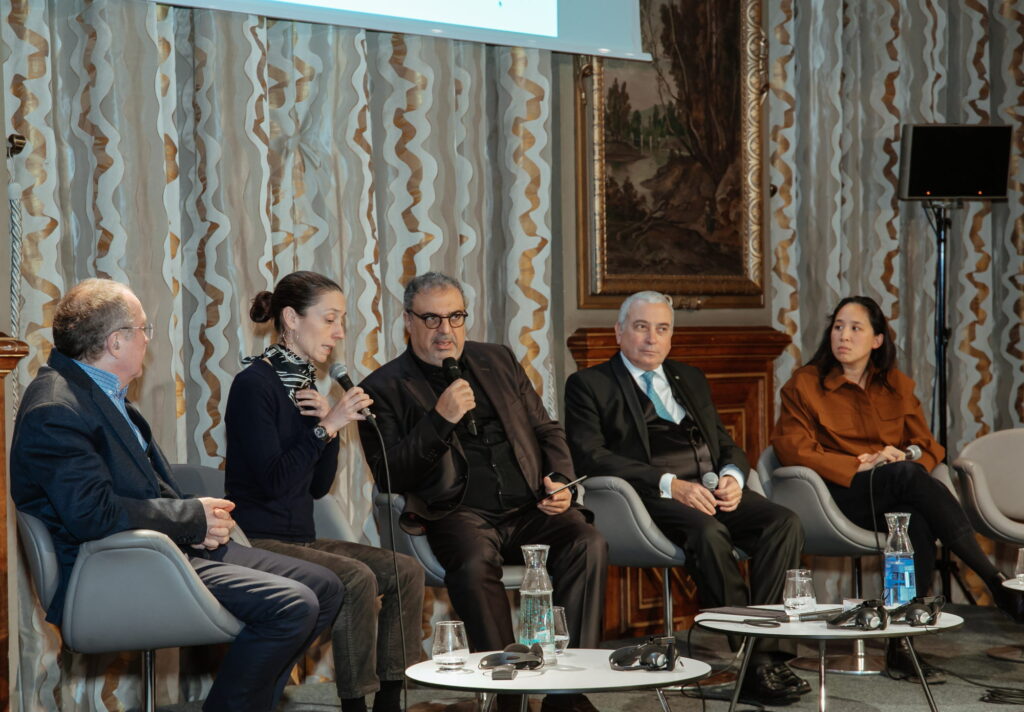
Céline: “For me, the transmission was done by my grandmother. Vietnamese cuisine, the dishes were put in the middle of the table. At the age of 21, after losing her, I felt the need to communicate with her again.”
Laurent: “I knew both my grandmothers, the second one didn’t cook. My mom gave me 15 cooking cards. The trigger has occurred. The gastronomic meal of the French is part of the heritage.”
Apollonia: “In my case, the transmission was very sudden and unexpected, following the death of my father in a helicopter crash 21 years ago. I was only 18 years old.” I reproduce here the little text that Apollonia was kind enough to write to me and which explains the production of sourdough at Poilâne. “We start with a piece of dough left in the mixer, called the mother, which starts making the batch. From this starting point, the leaven takes shape, after a few hours. Then, by adding cereal flour, salt, and water, we obtain the bread dough that we will transport to a pastry maker where the dough rises for the first time. But we’re careful to keep some of that bread dough in the kneading machine to start the sourdough for the next batch. And so, for 90 years, from batch to batch, from pair of hands to pair of hands and from generation to generation, we have nurtured this chain of life from field to plate.”
Patrick: “Transmission is defined by jobs related to food. Kitchens are evolving, professional transmission is different from family transmission.”
Céline: “Cooking is passed down from mother to daughter. Does the heyday of liberated women see the end of transmissions?”
Laurent: “We are witnessing an explosion of delivery drivers.” Apollonia: “Learning happens through emulation.” Laurent: “Transmission equals civilisation. The Town Hall was demolished in 1860 and completely rebuilt.” Céline: “Vietnamese cuisine is very balanced without Vietnamese ingredients.”
Laurent: “The best organised countries in terms of cuisine are China, Italy, Spain and France. Technology challenges the mission of transmission. With the net, we have access to all the recipes.”
Are all words equal?
The third and final theme (Fig. 7) to be discussed includes Alexandre Col from the Swiss Academy of Gourmets and the Table des 13, Alexandra Michot from the 50 Best, Hélène Pietrini, Managing Director of La Liste and Michael Zee, British influencer.
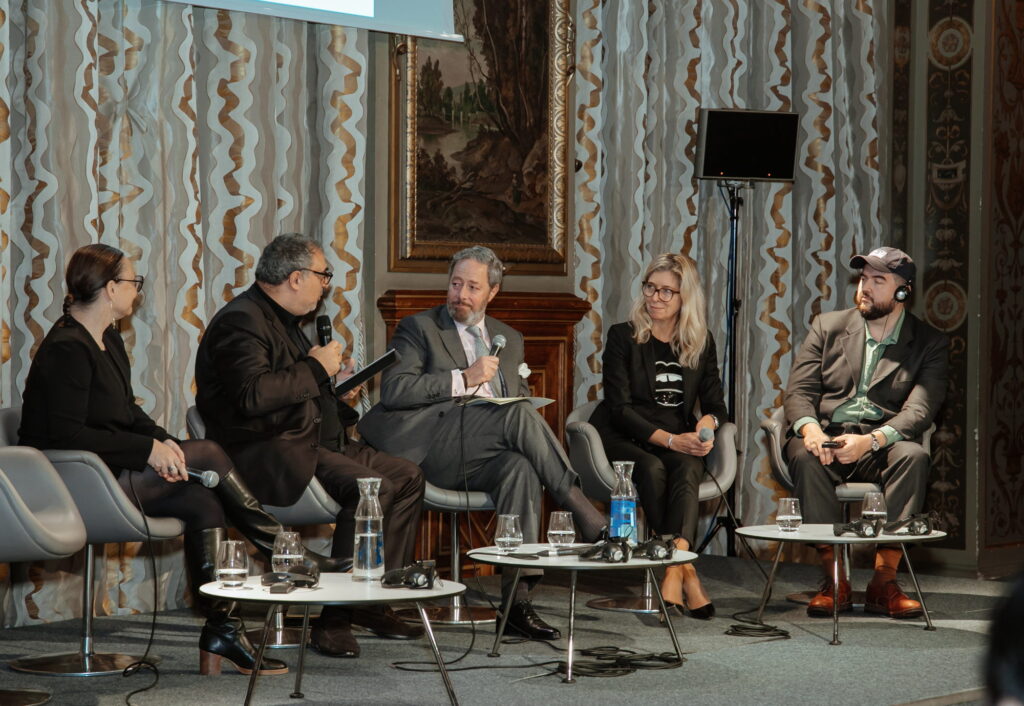
Michael: “The restaurants are customer-friendly, it’s a Parisian experience. When you rely solely on the Michelin Guide’s selections, you miss a lot. This can be pernicious and have a negative impact.” The conference ends well after 4:30 p.m.

